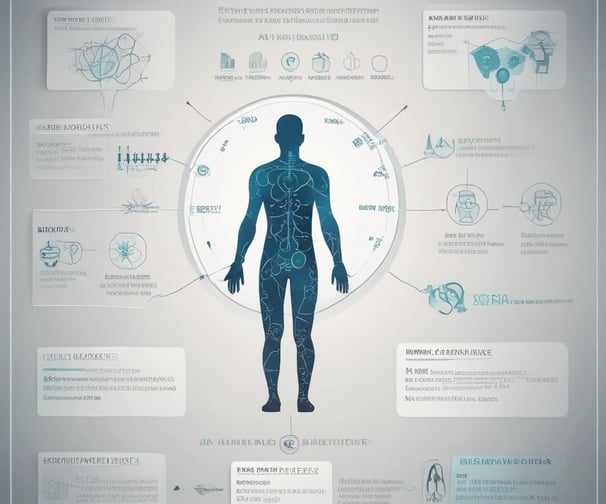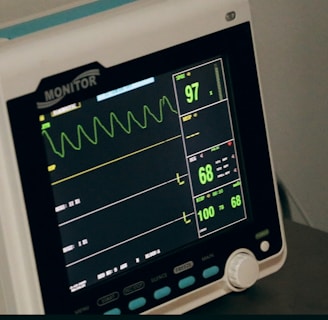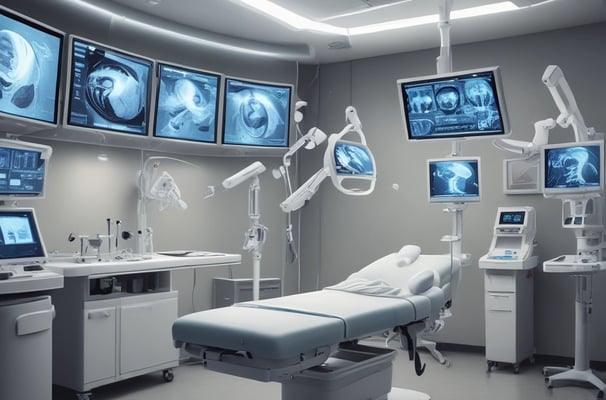How AI is Transforming Healthcare: Innovations, Benefits, and the Future of Medicine
Discover how AI is revolutionizing healthcare by improving diagnostics, personalizing treatment, enhancing patient care, and streamlining operations for a smarter, faster, and more efficient future.
AFFILIATE
4/5/20255 min read
Introduction
Artificial Intelligence (AI) is reshaping industries across the globe, but its impact on healthcare is especially revolutionary. With the integration of AI in healthcare, we are witnessing smarter diagnostics, personalized treatments, and faster, more efficient operations. This blog explores the key areas where AI is making a difference, highlighting both current applications and the promising future of AI in medicine.


AI in Medical Diagnostics
AI diagnostic tools are significantly improving the speed and accuracy of disease detection. From radiology to pathology, AI medical diagnostics can analyze complex medical images faster than traditional methods, leading to early detection and better outcomes.
AI improve medical diagnostics by identifying patterns invisible to the human eye.
AI-driven diagnostics reduce the rate of human error.
Next-generation healthcare AI enables real-time analysis of patient scans and lab results.
Intelligent healthcare systems are now capable of predicting potential health issues even before symptoms surface.
AI in healthcare management helps hospitals prioritize patient cases based on severity and urgency.
AI in healthcare isn't limited to image analysis; it also includes analyzing large volumes of patient history, genetic information, and lifestyle factors. This holistic understanding supports more accurate diagnoses, resulting in better treatment outcomes.


Personalized Treatment with AI
Personalized treatment with AI represents a major leap from the traditional one-size-fits-all approach to medicine. With the help of AI, healthcare providers can now design treatment plans tailored to individual patients' genetic makeup, lifestyle, and medical history.
AI healthcare technology analyzes huge datasets to suggest custom therapies.
Healthcare personalized medicine AI helps minimize adverse drug reactions.
AI-powered healthcare innovations consider real-time data from wearables and health apps.
Smart healthcare solutions allow adjustments to medication or therapy in real-time.
Patients dealing with chronic conditions such as diabetes or heart disease particularly benefit from AI-assisted personalization. Machine learning models can predict patient reactions to various treatment plans, enabling doctors to make better-informed decisions.


Enhancing Patient Care with AI
Enhancing patient care with AI has made healthcare more accessible and responsive. Through tools such as virtual assistants, AI-driven chatbots, and remote monitoring devices, patients can receive continuous care beyond hospital walls.
AI in patient care delivers 24/7 support through automated systems.
AI-assisted patient care provides reminders, emotional support, and appointment scheduling.
AI healthcare advancements reduce unnecessary visits through effective remote diagnostics.
AI in healthcare streamlines the doctor-patient communication process.
One standout example is AI-powered virtual nursing assistants that guide patients post-discharge, reminding them to take medications or schedule follow-ups. These tools have been shown to increase adherence and reduce hospital readmissions.


AI Streamlining Healthcare Operations
Behind the scenes, AI is revolutionizing how hospitals and clinics function. By streamlining hospital operations, AI helps institutions become more efficient and cost-effective.
AI in hospital operations automates scheduling, billing, and inventory.
AI healthcare management improves bed occupancy rates and staff deployment.
AI-driven healthcare processes predict peak patient hours and plan accordingly.
AI efficiency in healthcare leads to reduced administrative overhead.
This automation allows healthcare providers to focus more on patient care than paperwork. For instance, smart AI healthcare systems can automatically assign available doctors based on patient needs and doctor specialties, improving both speed and accuracy.


AI in Medical Research and Drug Development
Another major area of growth is in medical research. AI accelerates drug discovery and development, drastically cutting down time and cost.
AI in healthcare analyzes vast molecular data to identify new drug candidates.
AI-powered simulations predict how drugs will interact with the human body.
Revolutionary AI in medicine reduces years of trial and error in labs.
Smart AI healthcare systems assist in running virtual clinical trials.
By using AI to simulate human biology, researchers can test thousands of compounds rapidly, narrowing down the most promising ones before moving to human trials. This approach speeds up innovation and brings treatments to market faster.


AI and Remote Healthcare Solutions
With the rise of telemedicine, AI has made it possible to deliver healthcare services remotely with incredible precision and personalization.
AI healthcare technology powers diagnostic apps and remote consultations.
AI in healthcare management ensures secure and efficient telehealth experiences.
AI-driven healthcare processes help monitor vital signs and analyze behavioral patterns remotely.
Smart AI healthcare systems maintain electronic health records securely and seamlessly.
This is particularly beneficial in rural or underserved areas where healthcare professionals are limited. Patients can receive expert care without leaving their homes, thanks to AI-driven platforms that support remote diagnosis and treatment.


The Future of AI in Medicine
The future of AI in medicine is incredibly bright and full of potential. We’re already seeing signs of a massive transformation underway.
AI healthcare revolution will include predictive analytics to stop diseases before they start.
AI in medical treatments will assist in robotic surgeries with near-perfect precision.
Healthcare innovation with AI will focus on preventive care and longevity.
AI solutions for healthcare providers will expand to mental health, elderly care, and pandemic response.
The next decade will likely see AI embedded in every healthcare workflow, offering support from diagnosis and treatment to recovery and aftercare. Healthcare professionals must stay ahead of this trend by continuously learning and adapting to intelligent healthcare systems.


Conclusion
AI in healthcare is no longer a concept of the future—it's our reality. From AI-driven diagnostics to AI healthcare management systems, these intelligent technologies are transforming every layer of care. With enhanced accuracy, personalization, and efficiency, AI-powered healthcare innovations are making life better for patients and easier for providers.
By embracing AI, the medical industry is stepping into a new era of care—faster, smarter, and more compassionate. Whether you’re a tech lover or a healthcare professional, understanding how AI is changing the medical world is key to staying ahead.
Stay connected with Gadgetry to keep up with the latest smart healthcare solutions and other cutting-edge tech reshaping our lives.
Explore
Find cutting-edge tech and expert recommendations here.
Reviews
Gadgets
© 2025. All rights reserved.
